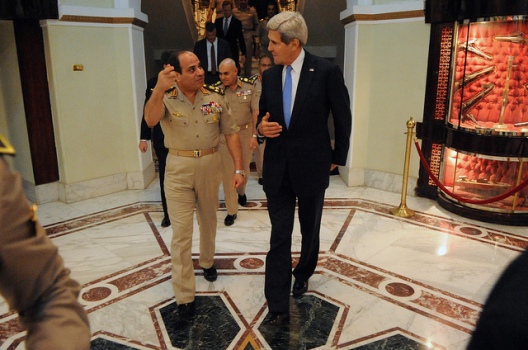 Secretary of State John Kerry called on the military-backed interim government to “keep faith with the roadmap and the path ahead to continue the march to democracy” during his November 3 stop in Cairo, one of several references he made to the roadmap as the key indicator of how things are going in Egypt. Kerry can be forgiven for trying to find a concrete yardstick to cling to in evaluating what is likely to happen next in Egypt and on what basis the United States can decide whether to restore the assistance that was reduced recently. But he chose the wrong one.
Secretary of State John Kerry called on the military-backed interim government to “keep faith with the roadmap and the path ahead to continue the march to democracy” during his November 3 stop in Cairo, one of several references he made to the roadmap as the key indicator of how things are going in Egypt. Kerry can be forgiven for trying to find a concrete yardstick to cling to in evaluating what is likely to happen next in Egypt and on what basis the United States can decide whether to restore the assistance that was reduced recently. But he chose the wrong one.
Admittedly, this is complicated. As soon as a military leader takes control from an elected leader, as happened July 3 in Egypt, the world wants to know when there will be new elections to put civilians back in charge. And indeed, the civilian president appointed by Defense Minister Abdel Fattah al-Sisi put into place a roadmap that features a rewriting of the constitution (currently underway), to be followed by a popular referendum on the document and then later by parliamentary and president elections. It is a better sequence than Egypt tried during its first post-Mubarak transition (parliamentary and president elections first, and only after that a new constitution), and in theory preferable to military leaders governing the country directly.
But there are two very large elephants in the room one has to ignore to use implementation of the roadmap as the primary gauge of Egypt’s progress toward democracy. First, there is the massive crackdown against the Muslim Brotherhood movement associated with deposed President Mohamed Morsi: more than 1,600 killed, 8,000 wounded, and 5,000-10,000 imprisoned since June 30; the Brotherhood dissolved as a legal entity and its assets confiscated; and more than 100 Islamist leaders likely to be tried for various offenses including espionage, treason, and inciting violence. In fact, the trial of Morsi began the day after Kerry’s visit, an uncomfortable fact that the Secretary astonishingly failed to bring up in public remarks during his time in Cairo. Nor did he mention the increasing pressure on liberals, human rights activists, and even comedians who have dared to question the wisdom of—or just joke about–military rule.
Elephant number two in the room is the likelihood that, even if the roadmap is implemented to the letter, it might well result in a weak façade of civilian government masking military/security rule. Although the draft has not yet been released, according to media reports the new constitution retains for the military broad authority to try civilians in military courts, as well as freedom from parliamentary oversight of its budget. Moreover, it apparently will remove even presidential authority over the military, as the Supreme Council of the Armed Forces will have a veto over the choice of defense minister. While some Egyptians are still trying to resist the military trials provision, in this moment of faith in al-Sisi, no-one seems to be focusing on what the other provisions will mean if passed: a military that exists apart from and above the rest of the government, not accountable to elected civilians.
Rather than emphasizing the transition roadmap, Kerry and other US officials should instead encourage Egyptian leaders to pursue what they have been missing all along: a process to build broad consensus among civilians on a transition roadmap leading to democratic institutions and rights for all Egyptians. Remarks by Kerry and other US officials surrounding his trip made some brief nods to “inclusion” and hinted that strict implementation of the roadmap would be inadequate unless it resulted in more rights for citizens, but they still ducked the hard truth. The trends are in the opposite direction; a month ago speaking of the need for “reconciliation” with the Brotherhood was commonplace (albeit empty in face of the crackdown); last week Deputy Prime Minister Ziad Bahaa Eddin got into hot water merely for mentioning the word.
Right now Egypt is headed into one more phase of a transition in which exclusion and zero-sum politics have prevailed at each turn: first the military conspired with the Brotherhood to exclude secularists, then the Brotherhood tried to dominate and ignore all others, and now the military is cooperating with at least some secularists to exclude most Islamists. This latest phase might endure longer than the others, simply because the military is now willing to employ much more coercion, but there is little possibility it will bring stability, economic opportunity, or democracy to the country.
So enough pressing the military to do what it already intends to do, which is to implement its own roadmap. If the United States intends to exert influence at all—which Kerry’s visit suggests it does—then use it to press for ending the crackdown and urging the military to hand control of politics back to civilians. Only then can Egyptians develop a consensus on a way forward that will be broad enough to be viable.
Michele Dunne is an Atlantic Council vice president and director of the Atlantic Council’s Rafik Hariri Center for the Middle East.
Image: Photo: US Department of State
